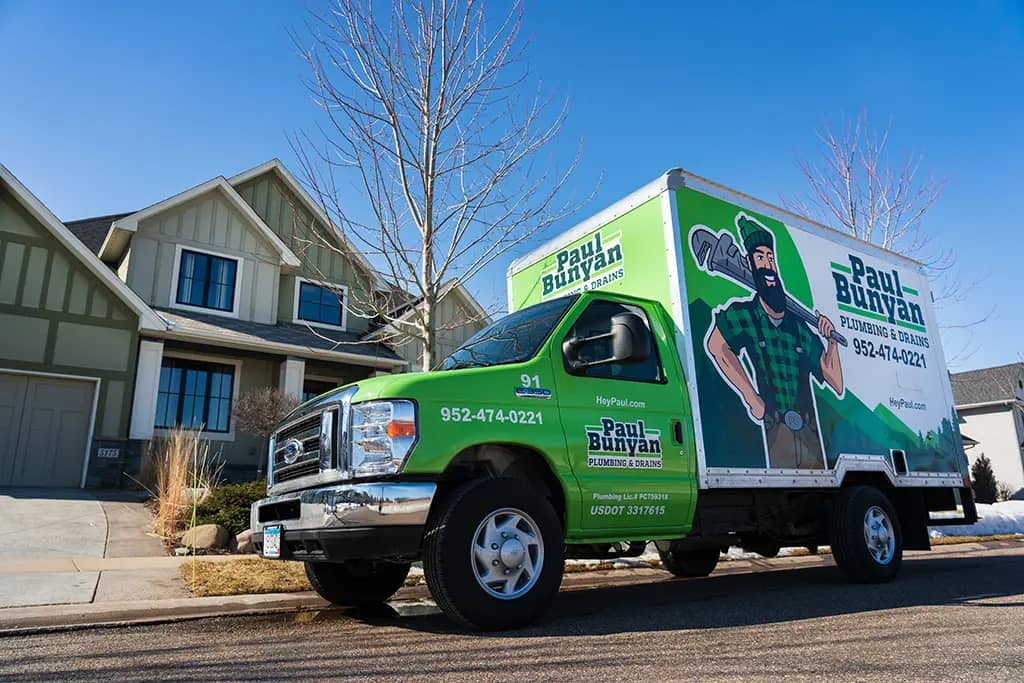Plumbing emergencies can happen to anyone. One of the more dangerous plumbing problems is a gas line leak. This toxic chemical can cause physical injury, or even death.
All homeowners who use gas power should know a bit about how it is supplied, what signs to look for, and what to do in case of a gas line leak. If you are worried about gas line repair contact the professionals at Paul Bunyan Plumbing & Drains to have them come out to check your system so you can have peace of mind.
How Gas Lines Work
If your home uses gas to fuel your furnace or other household appliances, there is a gas supply line directly connected to each item. Natural gas is the most often used type of gas in homes. The gas is supplied to your appliances by your utility company, via an underground pipe system.
Residential gas lines in St. Paul, MN must be installed by a professional plumber. This ensures that all gas lines are correctly run and connected, so no problems occur. However, over time problems can happen.
Gas leaks are extremely dangerous for several reasons. First and foremost, the gas is toxic to breathe. It is also very flammable, creating the risk of a home fire. To make certain your family and property are safe, you need to act quickly if you need gas line repair.
What to Do if You Have a Gas Leak
Natural gas has no aroma. It has an odor added to it, so you can tell when you need gas line repair. If you smell a sulphur smell, like rotten eggs, you need to take action fast.
The first thing to do is immediately call your fire department, then turn off the gas line connecting to the appliance or appliances where gas is escaping into the house. Next, get every person and pet out of the house as soon as possible. When you are a safe distance from your home, call your plumber for emergency repair services. Do not let anyone back into the house until you get word from your fire department that it is safe.
When Do I Need a Gas Line Repaired?
There are two main reasons for gas line repair issues: aging of pipes and gas pressure build-up. But there are other things that can cause problems for your gas lines. Invasive root systems can grow into your gas supply lines underground. Accidents during excavation can break your pipes, and severe weather conditions can also create the need for gas line repair.
The process for gas line repair depends upon what kind of problem is occurring. You could have a faulty gas connection or improper gas line hook-up causing the issue. Or your gas line could get pinched, causing a tiny leak in the line. Take a look at some common reasons your gas line may be leaking.
Household Appliances
The gas may be leaking at the connection of the gas supply to the appliances it powers. There are seals placed at each connection. As time passes, these seals can wear out and become corroded. When these seals are compromised, a leak can develop.
Compromised Piping
There is an intricate system of underlying pipes that bring the supply of gas to your home. These pipes can begin to break down over time. In some cases, the pipes simply wear out from age. Others have a loose or broken connection to the other pipes. Older homes are especially at risk for these kinds of problems, since the piping may not have been replaced in years.
Lack of Ventilation
Appliances that generate heat create the by-product carbon dioxide. If your appliances are not functioning properly, the levels can get extremely high. Some big appliances, like a home heating unit, have an exhaust fan or chimney to get rid of the carbon dioxide produced. This works great, considering everything is in good working order.
However, if your exhaust fan quits working or your chimney gets blocked, the carbon dioxide can start to fill your house. It is odorless, so if you use gas heat, you should have your home tested periodically to make sure there are no problems with your air quality.
Detecting a Gas Leak
Having a gas leak in your home is a frightening thought. To protect your loved ones and your valuable property, it is important to know how to detect a gas leak. If you don’t trust yourself to recognize a gas leak, you may want to have a carbon dioxide alarm installed in your home. Here are the signs to be on the lookout for in your home.
Sulphur Smell
This is often the first sign of a leak in the gas line that is noticed. The additive in natural gas smells like rotten eggs, so it is generally easy to identify.
Whistling Sound
If you have a gas leak, you may hear a whistling or hissing noise coming from the location of your gas lines. This is caused by the natural gas escaping from the leak.
Dust is Blown Around Near Your Gas Line Outside
This is a bit harder to detect than some of the other signs. If you live in a windy area, you may have a hard time deciding just what is blowing the dust around. But, if you do notice that, near the outside gas line, the dust is blown around, it could be done by the leaking gas.
Higher Than Normal Gas Bill
Natural gas usage varies from season to season. But if your gas bill has jumped to a surprising cost for no discernible reason, it may be because you need gas line repair. You will need to have your St. Paul, MN home checked out by a professional plumber, so you can stop paying for the natural gas that is escaping.
Contact Paul Bunyan Plumbing & Drains to find out about our comprehensive gas line repair services today.


